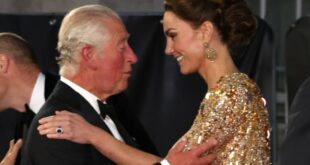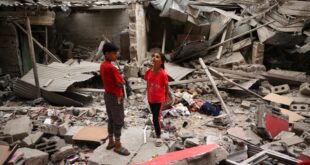Ukraine says it is short on air defence systems, ammunition and soldiers
In the early days of January, at a U.S. military base in Germany, Ukrainian military planners huddled with their counterparts from the United States and Europe for a week-long war game session focused on how to defend against the Russian military as its full-scale invasion of Ukraine is set to enter its third year.
And 2024 could see Ukraine on the defence for most of it.
Last year, Ukraine's counteroffensive yielded few battlefield gains. Defence experts say as Ukraine grapples with a shortage of ammunition and troops, it is in need of a reset and rebuild.
But that comes as support from one of its biggest backers — the United States — wavers and other countries face criticism for not doing more or acting urgently enough to help Ukraine defeat Russia.
"It leaves Ukraine having to fight a defensive action … with insufficient resources," said Tim Willasey-Wilsey, a visiting professor in the war studies department at King's College London.
"I think most people estimate that Ukraine could hold out in 2024. But that leaves a big question about 2025."

Why Ukraine’s counteroffensive has stalled
21 days ago
Six months into Ukraine’s much-anticipated counteroffensive against Russia, experts say the campaign has largely stalled. CBC’s Briar Stewart breaks down what’s gone wrong and what might happen next.
In recent months, while Ukraine tried to push Russia back in the south and in the east, it also built fortifications along the sprawling front line in an effort to impede a Russian army that has been able to replenish its weaponry by ramping up domestic production and leaning on the likes of Iran and North Korea to help supplement it stocks.
Russia, with a population of more than 140 million, has been able to boost its military ranks, but experts say it still struggles on the battlefield because of a deficient command and control structure.
Five months after Ukraine launched its counteroffensive, the country's top general described the situation as a stalemate to the publication The Economist, but backtracked on that when speaking to a Ukrainian publication a month later.
Ukraine and Russia are digging in for the next phase of this protracted war.
While there could be few changes to the front line in 2024, the international political landscape could vary greatly if Donald Trump or another Republican is elected president of the United States in November. A $60-billion aid package is stalled in the U.S. Congress as Republicans refuse to pass the funding unless Democrats agree to tighten security at the border and crack down on illegal crossings.
Looking for air defence
As Ukraine President Volodymyr Zelenskyy met with the leader of Lithuania in Vilnius on Wednesday, he vowed that this year will be decisive for Ukraine and its partners, adding that one of the largest issues was the country's lack of modern air defence systems.
Last January, Canada promised to supply Ukraine with a $400-million surface-to-air-missile system. It has been paid for, but not yet delivered.
The system, which is known by the acronym NASAMS, is jointly manufactured by U.S. and Norwegian companies and it is not clear when it will be ready to be deployed to Ukraine.

Why Ukraine can't beat Russia’s 'elastic defence' | About That
1 month ago
Progress on the battlefield between Russia and Ukraine has slowed in both directions. Andrew Chang explores Russia's "elastic defence" tactic and why Ukraine is struggling to find a strategic edge.
In December, a senior Ukrainian army general told Reuters that a shortage of ammunition, particularly artillery shells, was forcing the army to scale back military operations.
"They're not able to fire as many shells … it's dropped from maybe 7,000 a day to about 1,000 to 2,000 across the entire front," Patrick Bury, a former British army captain and former NATO analyst, said in a Zoom interview with CBC News.
Bury, who is a senior lecturer in security at the University of Bath in western England, says Russia now has superiority over Ukraine when it comes to the number of artillery shells that can be fired over the front line.
"This is mainly because the European production, the U.S. production, although ramping up significantly, hasn't got to where it needs to be. "
Calls for more support, faster
Earlier this week, German Chancellor Olaf Scholz criticized members of the European Union for not doing enough to deliver sufficient weapons to Ukraine, a point that was made throughout a report published by Estonia's Ministry of Defence late last year.
It stated that the EU has delivered 300,000 out of one million artillery rounds already agreed to and would have to significantly increase the pace of production to meet Ukraine's minimum need over the next two years.
With collective support, the report predicts that Ukraine will win the war by 2026 at the latest.
Russia has been able to increase its production of military vehicles and artillery by putting its economy on a war footing, with some factories running 24/7, said Konrad Muzkya, a defence analyst and director of Gdansk-based Rochon Consulting.
Muzyka told CBC News that there isn't accurate data about Russian levels of production, but independent Ukrainian analysts believe that Russia is able to produce, modernize and repair 1,000 tanks a year.
"We would assume that the current rate of production is sustainable over the next couple of years," he said.
Zelenskyy doesn't think Ukraine is starting to lose the war
23 days ago
Ukrainian President Volodomyr Zelenskyy says despite mounting challenges, his country is not on the cusp of losing its war against Russia. 'We are living creatures,' he said through a translator, in response to a journalist's question. 'We fight.'
Muzyka said in October, Russia was able to launch a combined arms assault involving 10,000 to 20,000 men to try to gain control of the decimated community of Avdiivka, which lies about 20 kilometres north of Donestk in Eastern Ukraine. Muzyka described it as Russia's first large-scale co-ordinated assault since the beginning of the war.
Its military failed to capture Avdiivka, and Ukraine's president said thousands of Russian soldiers were killed during the assault.
Muzyka said it is an example of Russia's problematic command and control structure that sees troops sent directly into the firing line with little regard for their lives.
U.S. officials estimate that more than 300,000 Russian soldiers have been killed or injured since it launched its full-scale invasion on Feb. 24, 2022.
Through mobilization and recruitment, Russia has been able to bolster its military, but Russian economists have warned of a mounting labour shortage that has also been made worse by the millions who left Russia in the early days after the invasion began and after Russia announced partial mobilization in the fall of 2022.
Ukrainian mobilization
Millions have also left Ukraine, according to the United Nations refugee agency.
It is estimated that 30 million people live in the areas currently under Ukrainian control.
The country's parliament is reviewing a bill that would lower the age of mobilization from 27 to 25, while the military has asked for an additional 500,000 troops.
But getting the boots on the ground is only the first step, as experts say Ukraine's training system needs to be revamped to better prepare troops and the officers commanding them on the front line.

Putin answers hand-picked questions at 4-hour news conference
27 days ago
Russian President Vladimir Putin spent four hours answering hand-picked questions — submitted ahead of time — at a live year-end news conference. The questions ranged from the economy to Ukraine, but not about when the hundreds of thousands of Russian men sent to Ukraine can return home.
"You can imagine taking some volunteers off the street and giving them five weeks of training time to go attack Russian lines," said Bury, who noted that as a former infantry officer in the U.K., he was given a year and a half of training before joining a platoon.
He says Ukraine has had a lot of success using missiles and drones to target Russian military infrastructure, including the country's Black Sea Fleet, and believes that will be a key part of its strategy over the next few months.
That and continuing to press its partners to deliver the weaponry its military needs.
"Ukraine is in a bind," Bury said, because it wants to show its Western partners that it can win on the battlefield.
But Bury believes the decisions Ukraine makes this year should be more strategic.
"2024 is about resourcing this problem and getting the building blocks really properly in order to win what is a big, long war."
Russia escalating air attacks as Ukraine faces roadblocks in military aid in 2024
10 hours ago
U.S. and EU aid packages for Ukraine remain stalled as Kyiv pleads for more air defence capacity to deal with escalating Russian air attacks. Power & Politics speaks with Andriy Shevchenko, former Ukrainian ambassador to Canada, and Roman Waschuk, former Canadian ambassador to Ukraine.
ABOUT THE AUTHOR

Foreign correspondent
Briar Stewart is CBC's Russia correspondent, currently based in London. During her nearly two decades with CBC, she has reported across Canada and internationally. She can be reached at briar.stewart@cbc.ca or on X @briarstewart
With files from Corinne Seminoff and Reuters
*****
Credit belongs to : www.cbc.ca
 MaharlikaNews | Canada Leading Online Filipino Newspaper Portal The No. 1 most engaged information website for Filipino – Canadian in Canada. MaharlikaNews.com received almost a quarter a million visitors in 2020.
MaharlikaNews | Canada Leading Online Filipino Newspaper Portal The No. 1 most engaged information website for Filipino – Canadian in Canada. MaharlikaNews.com received almost a quarter a million visitors in 2020.







